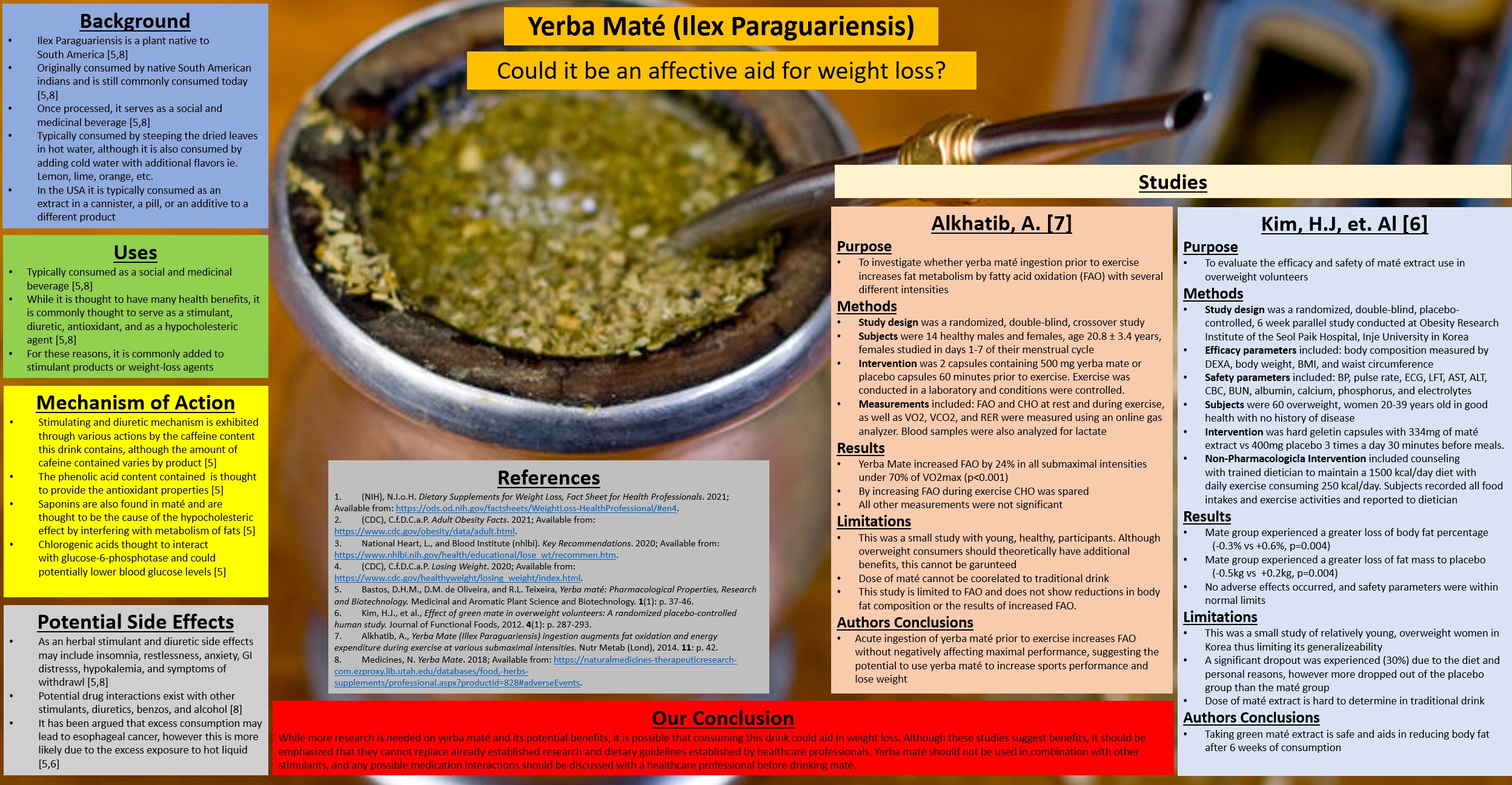Abstract
More than two-thirds of adults are overweight or obese [1]. Furthermore, the prevalence of obesity has increased from 30.5% in 1999 – 2000 to 42.4% in 2017 – 2018, and severe obesity has increased from 4.7% to 9.2% [2]. While healthcare experts agree that long-lasting weight loss stems from gradually reducing calorie intake, increasing physical activity, and following a healthy diet [1, 3, 4], people often turn to dietary supplements to aid their weight loss program. One herbal supplement that is becoming increasingly popular in the United States with the potential to aid in weight loss is yerba maté. Therefore, our objective here is to evaluate if yerba maté is an effective aid in weight loss.
Yerba maté (Ilex paraguariensis) is a plant from the subtropical region of South America originally consumed by the native South American Indians [5]. This infused drink is still consumed in South America as a stimulating herbal beverage. The drink is commonly prepared with dried, green maté leaves placed in a cup where cold or hot water is added and drunk through a metal perforated filter straw. Maté leaves are affordable and typically bought in bags produced by different manufacturers which contain a variety of added flavors. In the US, it can be drunk traditionally as it is in South America, extracts can be bought in capsule form, or it is available in prepared containers. While yerba maté may be an acquired taste, the bioactive compounds it contains may be beneficial for weight loss.
The potential for weight loss yerba maté provides is attributed to the active biochemical properties it contains. It provides a stimulant effect due to the natural caffeine content maté leaves contain, although the exact measure of caffeine content varies across brands [5]. Other biological compounds identified in maté are phenolic acids which have antioxidant properties, chlorogenic acid which can potentially lower blood glucose levels by interacting with glucose-6-phosphotase, and saponins which interfere with fat absorption creating a hypo cholesteric effect [5]. One double-blind placebo-controlled study directly comparing green maté extract to placebo in overweight subjects aged 20-39 years on a standardized diet and exercise program for 6-weeks showed a greater reduction in body fat (-0.3% vs. +0.6% p=0.04) and fat mass (-0.5kg vs +0.2kg p=0.04), no side effects were observed [6]. Another study investigating the effects of yerba maté consumption before exercise showed increased fat oxidation by 24% in all submaximal intensities below 70% of VO2max (p<0.001) [7]. This was a cross-over study performed in 14 healthy males and females which suggests an increased effect is possible in overweight individuals, however more research is needed.
It should be noted, however, that there can be side effects to taking yerba maté. As an herbal stimulant and diuretic, these side effects include insomnia, anxiety, restlessness, GI distress, hypokalemia, and symptoms of withdrawal [5, 8]. It has been argued that excess consumption of hot maté can lead to esophageal cancer, however, it is more likely related to excess exposure to hot beverages than the plant material itself [5, 6]. There are possible drug interactions with stimulants, alcohol, benzodiazepines, and diuretics due to the caffeine content in mate [8]. While maté has been consumed for many years, more research is needed to understand its properties.
In conclusion, while more research is needed on yerba maté and its potential benefits, it is possible that consuming this drink could aid in weight loss. While these studies suggest benefits, it should be emphasized that they cannot replace already established research and dietary guidelines established by healthcare professionals. Any health concerns should be discussed with a healthcare professional before drinking maté.
References:
1. (NIH), N.I.o.H. Dietary Supplements for Weight Loss, Fact Sheet for Health Professionals. 2021; Available from: https://ods.od.nih.gov/factsheets/WeightLoss-HealthProfessional/#en4.
2. (CDC), C.f.D.C.a.P. Adult Obesity Facts. 2021; Available from: https://www.cdc.gov/obesity/data/adult.html.
3. National Heart, L., and Blood Institute (nhlbi). Key Recommendations. 2020; Available from: https://www.nhlbi.nih.gov/health/educational/lose_wt/recommen.htm.
4. (CDC), C.f.D.C.a.P. Losing Weight. 2020; Available from: https://www.cdc.gov/healthyweight/losing_weight/index.html.
5. Bastos, D.H.M., D.M. de Oliveira, and R.L. Teixeira, Yerba maté: Pharmacological Properties, Research and Biotechnology. Medicinal and Aromatic Plant Science and Biotechnology. 1(1): p. 37-46.
6. Kim, H.J., et al., Effect of green mate in overweight volunteers: A randomized placebo-controlled human study. Journal of Functional Foods, 2012. 4(1): p. 287-293.
7. Alkhatib, A., Yerba Mate (Illex Paraguariensis) ingestion augments fat oxidation and energy expenditure during exercise at various submaximal intensities. Nutr Metab (Lond), 2014. 11: p. 42.
8. Medicines, N. Yerba Mate. 2018; Available from: https://naturalmedicines-therapeuticresearch-com.ezproxy.lib.utah.edu/databases/food,-herbs-supplements/professional.aspx?productid=828#adverseEvents.




Responses
Hello Jake and Feng – what are the two main things you learned from preparing and developing this topic?
One main that I learned was that this is a common ingredient in many other weight loss medications! It would definitely be a lot more sustainable to use if patients were aware of this fact and drank tea made from fresh leaves instead of buying expensive OTC dieting medications.
I learned that it has a pretty large effect on fatty acid oxidation at 24%. This was interesting because while I had heard many “theories” about what it does, I had never heard that before. I also thought it was interesting that this is available as capsules because I have only seen drinks.
Interesting topic. In the first study was there any weight loss reported? If so, what was it? In the second study, what did the authors state regarding caloric consumption? What was the degree of adherence to calorie recommendations? Is there anyone that should use this product and conversely, anyone that should avoid its use? Thank you.
Unfortunately, they did not do weight measurements. Their main goal was to measure the immediate effects on fat oxidation during athletic performance. As for the second study, the calories between groups were roughly maintained at 1500 kcal ± 300 calories. If you want the exact numbers let me know I’d be happy to provide them to you. I think pretty much anyone could try this drink if as long as no serious blood pressure problems or other health concerns are present. Because it is consumed so frequently and in such large amounts in South America it is regarded as safe. It should be noted that this is a soft stimulant, less than coffee. People looking for an energy drink might be disappointed. thanks for your questions!
I love yerba mate! Maybe I’ll take it next time I exercise. I knew people in Chile that swore by it when they lost weight.
Thanks for the comment Laura! Ya those chileans converted me to mate:) I am going to start trying it an hour before working out too, we can run our own study!
Great poster you guys! I am curious how big of interaction Yerba Mate interacts with other stimulant products? Is this an additive effect or synergistic? It is dangerous to mix the two?
Great question Chloe! Because of the caffeine that is in yerba mate and it greatly interacts with other stimulants such as amphetamines. This may result in dangerous results for those who have cardiac issues such as high heart rate and high blood pressure!
Scary! Thank you for the answer 🙂
Thanks, Chloe! As far as Natural Medicines and other things I’ve looked up, it is just an additive effect from the caffeine content it contains. Let me know if you have any other questions
I was going to ask about safety also! I know weight loss products are notorious for carrying a lot of risk. But it looks like your studies did not see a lot of adverse reactions. Sounds like it should maybe just be avoided in specific populations but is relatively safe for others?
To be honest, it is so popular in South America, studies say that people often drink more than 1L of it a day! (I can find a reference if you want). But they are obviously using the same leaves and just continually steeping them in water. I would argue that this drink is a mild stimulant that contains caffeine.
Awesome! Thanks for the response.
Hey Jake and Feng! After my sister came home from Brazil she drank mate every day for months! I was wondering if you guys were able to see how much caffeine content is generally in mate? I know it contains caffeine but have never seen how much it actually has.
Good question Brenae! To be honest, a lot of people ask this question and the problem is it varies pretty significantly between products. Interesting fact, most of the pure bags that you buy of Yerba Mate from countries like Brazil or Argentina don’t even list the caffeine content. This drink does act as a stimulant and it does have caffeine, but I would argue it is not as strong of a stimulant as say, coffee.
So did I. I always had this thought in the back of my mind that it was actually helping to make me skinnier. However, in thinking back on it, I think it helped me feel healthier in the sense that I was well hydrated (not to mention a regular bathroom user because of it…), which caused me to exercise more and eat healthier at the time. The latter two were probably the causes of the weight loss.
ha ha, great comment Tyler. Yes, I think it should be noted that people that start drinking mate note quickly that they are using the bathroom more than usual.
Super interesting topic! What is the cost comparison between purchasing the fresh leaves to make tea vs. the OTC products that are available?
The OTC items here obviously have a mark-up value that I consider to be more expensive compared to the pure leaves, although they are pretty cheap. Just a quick search online, you can get a bottle of #90, 600mg for 10 bucks. Whereas you can buy a 1 kg bag of it averaging around $5.
Hello Jake and Feng!
I noticed Yerba Mate was listed as having antioxidant properties. Were you able to find any studies on its use and efficacy as an anti-bacterial, anti-parasitic, and anti-fungal agent?
Hey Ryley!
Unfortunately no we weren’t able to find any. I didn’t search for that but it would be interesting to look into. All I found was that it can potentially work as a scavenger in the body for donating hydrogen or picking up free radicals, but as I stated, I have no study on that efficacy. As far as an anti-bacterial, parasitic, and fungal agent I don’t think there are studies on that. Thanks!
Comments are closed.